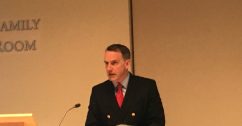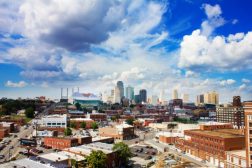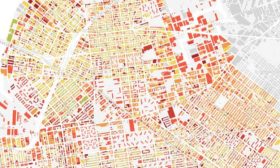Harvard prof: More people in cities means more tech innovation

Moving more people into cities is the key to fostering technological innovation, according to research by a Harvard University economics professor.
At a lecture at American University Thursday, Edward Glaeser laid out his theory about the best way to promote the growth of tech discoveries: the more people that live in cities and exchange ideas, the faster new technology tends to develop. He believes that has major implications for governments of all sizes, as leaders weigh strategies to help foster this kind of innovation by making cities more welcoming for everyone.
“Innovations occur when people are connected to each other,” Glaeser said. “No matter what goes on in cyberspace, it can’t compete with sharing a smile or a kiss.”
The thrust of Glaeser’s argument is that cities act as “forgers of human capital.” Over the course of his speech, he pointed to how smart people working in close proximity to one another — sharing ideas with each other, or even stealing them, when necessary — has helped kickstart eras of innovation from Florence, Italy, in the 16th century to Chicago in the 20th century.
“Close connections in urban streets or in office buildings promote the flow of ideas,” Glaeser said.
Accordingly, he sees the recent trend of young people in America settling in urban environments, rather than the suburbs, as immensely promising for the future of the country. While he cautioned that governments shouldn’t necessarily “stack the deck or force urbanization,” he also warned against policies aimed at restricting the flow of people of all income levels into cities.
Specifically, he feels that city leaders across the country can do more to grow public transportation efforts, which have long been key to the growth of cities. He even cited one study from Brown University researchers suggesting that a new highway built to pass through a city reduces its population by roughly 18 percent. Since driving cuts down on the time of commutes, Glaeser sees roads encouraging people to move out of cities, creating traffic congestion and pollution in the process.
“If you build it, they will drive it,” Glaeser said. “Behavioral response kills you.”
Instead, Glaeser hopes to see cities promote public transit options of all kinds, but he thinks there’s room for innovation particularly with bus systems, especially given the rise of technology to better track the of vehicles around cities.
“The beauty of buses is they’re enormously flexible, you can scale the number of them up and down,” Glaeser said. “That could be a remarkable place for innovation, if we stop treating them like the ugly stepchild of transportation.”
Glaeser even feels that more American cities could adopt a model similar to one used in Singapore, where the government charges drivers a fee to use highways during busy times, but he acknowledged that could be “politically challenging.”
But beyond just attracting more people to cities, Glaeser foresees governments taking an active role in attempting to “engineer innovation” going forward. In particular, he pointed to the efforts to build “innovation districts” in Boston and other cities as one potentially innovative solution, but he also noted that it’s unclear how effective this strategy is for growing successful tech businesses.
However, he still wants cities to keep tinkering with ways to promote innovation and expand it to low-income areas as well.
“The question isn’t how to get more entrepreneurial capital at Stanford or MIT, but in ordinary neighborhoods instead,” Glaeser said.
Indeed, Glaeser sees the “largest question” for cities moving forward is how to build this sort of innovation without leaving anyone behind.
“Cities are opportunity machines, but not for everyone,” Glaeser said. “The American challenge for the 21st century is how to make metropolitan areas places of opportunity for everyone.”
Contact the reporter who wrote this story at alex.koma@statescoop.com, or follow him on Twitter at @AlexKomaSNG.






